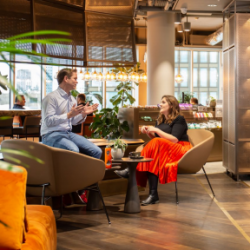To provide the best experiences, we use technologies like cookies to store and/or access device information. Consenting to these technologies will allow us to process data such as browsing behaviour or unique IDs on this site. Not consenting or withdrawing consent, may adversely affect certain features and functions.
The technical storage or access is strictly necessary for the legitimate purpose of enabling the use of a specific service explicitly requested by the subscriber or user, or for the sole purpose of carrying out the transmission of a communication over an electronic communications network.
The technical storage or access is necessary for the legitimate purpose of storing preferences that are not requested by the subscriber or user.
The technical storage or access that is used exclusively for statistical purposes.
The technical storage or access that is used exclusively for anonymous statistical purposes. Without a subpoena, voluntary compliance on the part of your Internet Service Provider, or additional records from a third party, information stored or retrieved for this purpose alone cannot usually be used to identify you.
The technical storage or access is required to create user profiles to send advertising, or to track the user on a website or across several websites for similar marketing purposes.
 New research from IPSE, the Association of Independent Professionals and the Self-Employed, claims that the number of solo self-employed people in the UK has fallen by 5 per cent compared to last year. The total number of solo self-employed (excluding those who have others working for them) has fallen from 4.6 million in 2019 to 4.4 million. Until now the sector had been growing continuously for 11 years – by a total of 40 per cent. (more…)
New research from IPSE, the Association of Independent Professionals and the Self-Employed, claims that the number of solo self-employed people in the UK has fallen by 5 per cent compared to last year. The total number of solo self-employed (excluding those who have others working for them) has fallen from 4.6 million in 2019 to 4.4 million. Until now the sector had been growing continuously for 11 years – by a total of 40 per cent. (more…)








 A third of flexible workspace providers reported that occupancy rates have remained relatively stable through the global lockdown, only falling by 10 percent. On average, operators reported demand for flex space at 52 percent of pre-Covid levels, but some suburban markets have seen significant growth and pricing in those areas has increased.
A third of flexible workspace providers reported that occupancy rates have remained relatively stable through the global lockdown, only falling by 10 percent. On average, operators reported demand for flex space at 52 percent of pre-Covid levels, but some suburban markets have seen significant growth and pricing in those areas has increased. 


 The number of self-employed people saying they have “poor” or “very poor” mental health has increased from 6 percent to 26 percent since the beginning of the pandemic (a 300 percent rise), claims new research by
The number of self-employed people saying they have “poor” or “very poor” mental health has increased from 6 percent to 26 percent since the beginning of the pandemic (a 300 percent rise), claims new research by 




















February 9, 2021
Getting the measure of better working cultures
by Mark Eltringham • Comment, Flexible working, Technology, Wellbeing, Workplace design